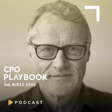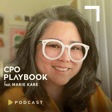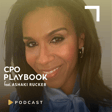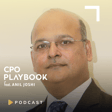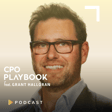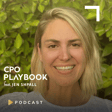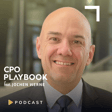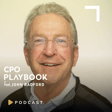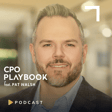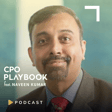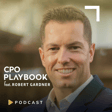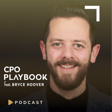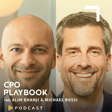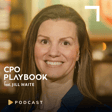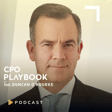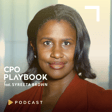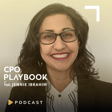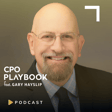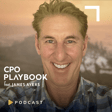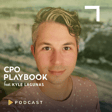Become a Creator today!Start creating today - Share your story with the world!
Start for free
00:00:00
00:00:01

Value-Driven Culture: AKQA São Paulo's Success with Google, Netflix, and Usher featuring Co-Chief Creative Officers Hugo Veiga and Diego Machado
Things take an interesting turn as we are joined by two creative visionaries—Hugo Veiga and Diego Machado from the world’s renowned design and creative agency, AKQA. Learn how AKQA São Paulo creates a values-driven culture, where principles aren't ideal but woven into their creative processes, client relationships, and talent acquisition strategies. This values-driven culture in creative agencies has attracted top-tier clients like Google, Netflix, and Usher, and helped them build a work environment that nurtures exceptional talent. Join these two creative minds as they reveal how authenticity impacts business success and provide actionable insights for creating a values-driven culture that fuels both creative and business achievements.
Transcript
Introduction to the Podcast
00:00:04
Speaker
Hello everyone, I'm Felicia Shakiba, and you're listening to the CPO Playbook Podcast. Join me and my guests as we feature insightful conversations with HR leaders, people scientists, and executives from diverse industries and functions, offering valuable perspectives on the future of work.
00:00:23
Speaker
Discover a unique outlook on navigating the complexities of the modern-day working world, exploring innovative strategies in talent management and corporate culture from the chief people officer's perspective. Tune in to stay ahead of the game when it comes to all things people related.
Impact of Organizational Culture on Turnover
00:00:44
Speaker
In this captivating interview, we delve into the profound impact of organizational culture on employee turnover rates, guided by a remarkable statistic derived from Asherm's global culture research report. Nine out of 10 workers, who rate their culture as poor, have thought about quitting. This statistic compels us to unravel the intricate dynamics that shape the retention landscape.
00:01:10
Speaker
A strong organizational culture possesses an enchanting allure, weaving a tapestry of shared values, beliefs, and norms that captivates employees within its embrace. Within this immersive environment, individuals find solace and purpose. Their personal values harmoniously align with the organization's vision and mission.
00:01:32
Speaker
This fusion fosters a profound sense of belonging, igniting a flame of loyalty and commitment that repels thoughts of seeking opportunities elsewhere. Thus, a robust culture becomes a barrier against turnover, cultivating sustained engagement and tenure.
Meet Hugo Vega and Diego Mercado
00:01:52
Speaker
In the exciting interview that follows, we embark on an impressive journey with Hugo Vega and Diego Mercado.
00:01:58
Speaker
Vega and Macado are founding members and co-global chief creative officers of the renowned AKQA Sao Paulo office in Brazil, a WPP company, recognized as the world's most awarded copywriter and art director at the 2013 CAM Lions International Festival of Creativity.
00:02:21
Speaker
Hugo and Diego won a record 23 Lions for five different projects. Their work for Dove Real Beauty Sketches earned Latin America's first titanium Grand Prix and has become the most-watched branded film of all time on YouTube with more than 165 million views. Time magazine named it the best commercial of 2013.
00:02:49
Speaker
Hugo Diego, thank you so much for being here. Welcome. Hi, Felicia. Thank you so much for having us. It's a pleasure. Thank you very much.
Founding AKQA São Paulo
00:02:58
Speaker
How did you get started when you founded AKQA Sao Paulo? Can you share the story behind its inception?
00:03:06
Speaker
In 2013, Diego and I, we were a team of creatives. We were not even creative directors at that time, although we led several projects. We were at Ogilvy São Paulo, and we launched Real Beauty Sketches, which was a project that gained a lot of attention worldwide. And we started gaining a lot of headhunters, agencies that were reaching out to understand if we would be interested in joining
00:03:35
Speaker
their companies. So we went to Cannes, we were going to have some interviews and before we went
00:03:43
Speaker
We said like, oh, what if someone offers the possibility of opening an office, an agency? And we said like, ah, no, we're not interested. So at the end, like we had an incredible conversations with Khan. And then we met the Jaz Ahmed, which is the founder of EKQA. So the letters of EKQA are the initials of his name. And a Jaz is for us almost like a spiritual entity.
00:04:08
Speaker
He's like the most humble human being, he's a visionary. We had a lunch with him at Cannes and it was really like something that we never experienced before. Like he was really such, such a humble, such a heartful person. And he made us that proposal and we told him at that time, like he said, oh, we would love you to open the Kiki Kuei San Paolo studio. So like, just like we really appreciate
00:04:37
Speaker
We feel honored with this invite, but we're not businessmen. We're creatives. We want to continue to focus our energy into create communication. And then we don't want to go into spreadsheets and things like this.
Creative Studio Philosophy
00:04:55
Speaker
And it was very honest with us. Don't worry. You'll be creating a studio.
00:05:02
Speaker
And we'll give you the support, all the bureaucracies, you'll have that financial support, but it's really like think about as a challenge, as creative minds to open something from zero and to apply the things that you love, or at least to rethink the future of a partnership between an agency and the brand. That was the backstory. Yeah.
00:05:28
Speaker
Of course, we accepted and started this journey. And one of the first briefs that we got was to actually find this house. And once we shared the story of the Radiohead and the story about getting into the house instead of going to the office, we started going to... Diego started to interrupt. Maybe it's good to tell the story of Radiohead because in that lunch, it was one of the things that made us accept.
00:05:56
Speaker
Yeah, okay, let's go. So during the lunch, we got that energy from him, like as Hugo mentioned, we don't understand about these things about energy and those stuff, but we really felt something differently with him. And from those conversations, he was sharing about his vision, about AKQA, about the newest studio was Paris, just having been open and founded.
00:06:19
Speaker
And we were trying to understand how was the magic of a gateway? How did they make this such beautiful work like so innovative, like so groundbreaking work and having this consistency across the globe? And the answer from Ajaz was like, the right people, the right place, and the work will come. The money will follow, but the work will be amazing.
00:06:45
Speaker
And we love that equation. It feels very obvious, but somehow, I think we were expecting some more realistic. Like, oh, we did this. We hired X amount of people. And then we did that. He was such a vision. Here's the vision. And on top of that, he brought like, yeah, recently I watched this documentary about Radiohead.
00:07:06
Speaker
And the story is basically they launched Creep and it was like a master. The song was like hits, top hits globally. Everyone was listening to that. And after the success comes the pressure. What else? What is next? Are you a one hit band? Can you keep doing great work?
00:07:26
Speaker
So to kind of like relieve that pressure and kind of like find a new way of creating, they rent a house in the countryside of London and they kind of were, we were like living there for a couple of weeks. The band was there, they were composing together, laughing together, crying together. Maybe like you're sharing these moments and they have like a chef that was like cooking and they were kind of like having this home spirit.
00:07:54
Speaker
And after this
Radiohead's Influence on Studio Environment
00:07:56
Speaker
process, they recorded and launched the work that was OK Computer, which for many is considered the masterpiece of the band. And the parallel was clear. The art creators, they have their own area. There was music and art. And we have ours. We talk about communication, advertising, innovation. They have the music label as their clients. We have our clients. We have Nike. We have Netflix. We have other brands that we partner.
00:08:24
Speaker
They have their fans and we have the audience. So it was kind of like a parallel between their process and our process as a creative industry. And on top of like everything he brought.
00:08:35
Speaker
Okay, let's find this house. Let's do what Radiohead did. Let's find a house. Let's find a chef. And let's build a community center where people can join us and co-create together. So it's not an office. It's a house that everyone, all the creatives in the community are welcome to partner with you guys, to partner with our clients. And from that, the work will come.
00:08:58
Speaker
Just listening to both of you speak, I have chills on how exciting this opportunity for you guys and whoever has taken this journey with you has been. So tell me what challenges did you face in the early stages of the company and how did you overcome them to establish a strong foundation? The first challenge was assembling furniture.
00:09:24
Speaker
Because we found the terrain, actually we found the house and we had to brought in an architect that was working on it. And we chose an architect that he only did restaurants and houses. So he never had an experience on doing offices. And that was purpose. We really wanted that, we really wanted to have a home feeling.
00:09:47
Speaker
But while we were reconstructing the house that we found, and actually there's a funny story, like when Ajás flew to São Paulo, we had like some houses for him to see. And I think this, the chosen one, and it was our favorite, the third one, he just entered the house and he said, like, he looked at it and he said,
00:10:11
Speaker
I'm having goosebumps. This is the one. And so I adjust, but we need to see other houses.
00:10:18
Speaker
This is the one, right? This is the one. When we're talking about something that is spiritual and very like comes from the heart and is like something very energetic almost, it is really how everything started. It was always about the heart and how can we humanize something that sometimes is very corporate. So we found the house, that was the one, and said like, hey, this is the one, right?
00:10:43
Speaker
Let's have lunch. You need to see the house. It was really funny. So we went, we found a place that we started working and we're going to have to assemble furniture for like one year to wait till the next house is ready. So that was the challenge.
00:11:02
Speaker
But the furniture metaphor is a good metaphor because when we started, in our first day, we were expecting some sort of email that would tell us how to assemble an agency, a new agency. So we were there on the first day.
00:11:20
Speaker
and we were joking to each other like oh maybe an email will come right like first step second step and we were like refreshing you know refresh on the email oh the email didn't come oh do you want a coffee let's have a coffee yeah let's talk about life let's go back to the email refresh nothing uh okay maybe we need to we need to
00:11:43
Speaker
roll our sleeves and really start doing it. And the way we did it, because we didn't have any formation, like we didn't have any forces to say like, oh, all to be leaders, nothing. And what the jazz said was like, go from your heart and do the things that you believe.
00:12:01
Speaker
And we started doing like, so our first hire was a person that we said like, this house needs a mom, a mother to take care of everyone. So our first hire was Mase that is still today, a mother to everyone that goes to the house. And when we say a mother is, she takes care of everyone. But at the same time, she's always like, Hey, who put this glass, dirty glass, forgot this dirty glass on the table. Like, so like
Non-Traditional Agency Focus
00:12:27
Speaker
we started
00:12:28
Speaker
that way and we were always thinking about to have a home feeling. That was always our vision. Even when we were talking to the architect, there was a moment that he wanted to close the kitchen. The kitchen stays on the third floor of the house. He said, we're going to close the kitchen because of the smells, would go to the open space that we have where everyone sits to work.
00:12:54
Speaker
And she's like, no, actually let's not close it because when you're at home, one of those home feelings is when someone is preparing coffee or someone is baking a cake and that goes through all the house. So no, let's keep it open. And although like there are some noises in the kitchen, like it becomes something that it's home feeling. It's not part of what you would expect in a normal office. So we started the agency.
00:13:24
Speaker
because we didn't have any formation, we just said, let's build a mantra for us. And it would be, we're going to do the work of our lives through the happiest process. And that would be the foundation.
00:13:38
Speaker
And all the decisions we made would go through that filter. We were very naive. And I think that that was one of the keys for success. Because we were naive and we weren't afraid of things going wrong. Because we were saying, if this goes wrong, it's just the beginning. There's an investment here, but it won't be in the broader context of AQA globally. It's not going to be a problem.
00:14:05
Speaker
So let's go, let's just do and be fearless. And that's how we started. So all the decisions were made thinking like we started by doing the things that we didn't like. So what are the things that we don't like? What are the things that don't make us happy? And so we just put there and said, okay, we're not going to be about this. Do you want to go Diego and go through that? No, yeah. I think like, uh,
00:14:29
Speaker
the naivety we had was the key for the success. Back then, I don't think we are thinking about it, but having this
00:14:39
Speaker
very organic and following your heart spirit was kind of like what guided us to take some bold decisions at the moment. But I'm not sure if we felt they were like such big decisions, you know, like you were kind of like the Radiohead spirit, like just composing and making something and suddenly became like the masterpiece of the band.
00:15:00
Speaker
I think it was something like that. We are taking the decisions as we believe, as we are discussing with Fajas, but we're very organic process. So I think one of the challenges was how can we change the mindset because we are creating something new. He brought the vision about the AKQA bringing the best people, partnering with the best clients and brands to create the best work. We didn't want to replicate what we've seen externally. So kind of like we have to reset
00:15:30
Speaker
our thinking, what we believe.
00:15:32
Speaker
And I think a lot of things that we were guided as Hugo mentioned was the things we hate, the things we don't want to have. For sure, we don't want to pitch. We hate pitches. It's not working the way we are pitching. So let's not pitch at least for a couple of years and see what happens. And in Brazil, there's the media binds inside the agency. So all the revenue from the agencies come from media buying, not necessarily charging for strategy and creativity.
00:16:01
Speaker
and we didn't like that as creatives so we said like oh we are not having that we are will be the first agency in brazil that won't do media buying we won't touch in that and we'll just charge for creativity and strategy and production
00:16:16
Speaker
So I think this type of decision was very natural, but we have to keep the mindsets refreshing all the time. So we're kind of like exploring like, what would be the newest thing? How we will hire people? Who should we hire? Do we need the same departments that we used to have in our previous jobs?
00:16:34
Speaker
create a new one or should we merge everything together and it's just like we call people by their names and there is no label. How many people can we fit? Back then there's an interesting story, we were starting understanding and reading about human behavior and one thing that we noticed is that since the beginning of society,
00:16:54
Speaker
There is a magic number about the number of people that can live together and collaborate together. Once you make more than that number, it starts splitting groups. So you have the South and North, rich and poor, you have this kind of division. So we read that the number was something between 70, 80, 60. So it's like, okay.
00:17:15
Speaker
This is our goal. Let's focus on that area. So you have like this home community, like we don't want to split in departments. Oh, creatives and strategy, accounts and these. So these kind of moments were like kind of our very first brief to design the house and design the rituals, the routine, the structure of the house. I think it was
00:17:41
Speaker
Probably the biggest challenge. And I think it keeps as a challenge to keep like resetting and creating a new shape for that. That's interesting. So a lot of the first movements that you made.
00:17:55
Speaker
was really around how are you going to work together and collaboratively under one roof? And it sounds like you had very specific values that you knew you wanted. Could you share some examples of how the company integrates those values into the day-to-day operations and decision-making processes? As Diego was saying, the things that we don't like, so no media buying, no pitches,
00:18:23
Speaker
and no working during the weekends. And those were like the beginning. And it's funny that when we said that and when we opened, there were some interviews from the industry media. We had the statement, so we only had the vision. You're starting something new. You don't have the work. You have the work that we did in other companies.
00:18:42
Speaker
We didn't like, OK, here's what we're doing. No, it was a vision. And we know that there were some some people from other agencies that in Brazil, people like to bet during the World Cup, you know, like I was going to win. And they started betting like how many months we would last because there were some some agencies that were closing, like opening and closing during that time. So like, oh, that guy's going to last like three months, you know. And the thing is that it was too
00:19:12
Speaker
It was against everything that the market had. And I think that was also the key of success. And again, the ingredient of being naive is to really believe if this is the right thing, let's push for the things that we believe that it's right. And then we found clients that were aligned with this vision. So our first client was Netflix and we were like only two. It was Mediego and Mase.
00:19:39
Speaker
And we became the Latin America Digital Agency for Netflix. Of course, we had the support of the network to do the work. And then we got Google that we just had a meeting with a team, a group of clients. They're amazing. And they went there. We had just a conversation under the magic mango tree because there was a garden with a mango tree.
00:20:03
Speaker
that we said that it was magic because we have meetings under the mango tree. We just shared the vision and they called us in the afternoon like, okay, you're going to do the first Google search campaign in Brazil. And from that on, like we started working with two big brands, two innovative brands that wanted to do things. They were searching for partners that would think differently and we started growing with them. So from the beginning,
00:20:29
Speaker
which also is a key of success. We had the stability because we were doing work and we were growing with these clients. So that allows us to, we wouldn't get into pitches because we were having work with them and we were getting more work. And then we would get other clients that would knock on our doors. And remember when we started, we said like,
00:20:50
Speaker
Diego cannot do a shitty project. Because if we do a shitty project, someone will come and knock on our door and say, like, oh, I love that shitty project you did. Can you make it for me? But a little bit shittier. And we say, like, no, we always need to be doing great work. That is the vision. And then we started doing great work with these two innovative brands. And then other brands started knocking on our doors and saying, like, I love that innovative kind of work.
00:21:17
Speaker
can we work together? And we were always conscious to Diego's point of not growing.
Protecting Creative Vision over Growth
00:21:23
Speaker
We didn't have a pressure to grow. Our pressure was to protect the vision. And this was something that Ajaz told us. We never had a conversation about numbers with Ajaz till today. It's always about what
00:21:38
Speaker
can we do? How is the team okay? Are you happy with the work that you're doing? So this is something that has been since the beginning, like we got the stability, we started growing the clients, we started attracting new clients that wanted to do that kind of work and wanted to also learn from these more fluid ways of working. And we started growing from that. Yeah. You ask about like the
00:22:02
Speaker
integration of the values. And I was thinking about it, like probably it's all about seeing the people beyond the employee and or the work label. Let's call it that. Just a few examples. Like when we first joined a kick way, we could have a book saying, Hey, this is what a kick way believes. Number one, the la la, number two is this is, or like a guide or something like that.
00:22:27
Speaker
We actually had the privilege to have like a local tour in a few studios, some of the studios that we had back then, maybe like 12 different studios. We visit like five or something like that. We started in London, visiting Paris, Berlin, San Francisco, Portland, New York, and a couple of different studios.
00:22:46
Speaker
So that way we could see the people not just like Imeos. We know who is the head of innovation and who is anti-hood and not like an Imeo or like a Slack. We could know the names and what they like to do, how they work, what is the process, their personal ways of working.
00:23:06
Speaker
I think that was one of the first things that we learned. So yeah, we had the privilege to, to visit some of the studios back then. So we went to London, to Paris, to New York, Portland, San Francisco, we spent a lot of time there. And this process made us understand who was behind the email. You know, like, it's not like one random email, but like, who is the head of innovation? No, we weren't meeting Emil, Andy Hood. We are meeting the ECDs, the managing directors, but like as people, not as
00:23:36
Speaker
just like a colleague is from work. So I think that that mindset, again, we are not thinking about this theory back then, but naturally we were doing that. And once we land back and started working, we started understanding that.
00:23:51
Speaker
People are eight hours a day in the work, but like all the other 16 hours affect them a lot. So when we are doing resourcing, like we do like a weekly creative resource or who is working on which project, we cannot just see like the projects they did or the hours they're available. We need to understand it. Are they happy? Are they excited? Are they passing through a challenging time in their lives? Are they depressed? Are they happy?
00:24:19
Speaker
So seeing the full spectrum of people. And also like when we are hiring the same thing, we were starting looking to portfolios and we invited people to the garden to meet and having like these conversations. People left and said like, oh, this doesn't match the portfolio and the person. Like it's not the same thing. So we started skipping the work that people did and just looking for personal projects. Let's see what they do like as,
00:24:47
Speaker
He's a photographer, he's like a musician, he's like a design chair, whatever. And we got passionate about it. People were asking, like, oh, do you want to see my portfolio? I said, no, like, send me whatever. Like, do you cook? Send a cake. We can check it. We can talk about it.
00:25:06
Speaker
From there, we understood that we tend to go very narrow on trying to understand people and just seeing the work they did. It's just like a small percentage. Lucky is about being exposed to the right brief in the right moment or get a job with the agency or client that you really wanted, and sometimes it doesn't happen.
00:25:29
Speaker
And there is a lot of ambition and excitement hidden in that person. So somehow if you can't find it when you are hiring or when you're doing the resourcing or meeting a new client. So I think this is something that we always try to do. It's really hard to read people and see what is behind. Especially nowadays, I think there's a lot of a personal side of people brought to work and brought, so we need to keep evolving that.
00:25:58
Speaker
But I think that is something that you were talking about, like how to integrate the values. And I think that that's key, that's key, especially for us in the KQA. We always saw ourselves as a, as a family. So, and we told everyone that a lot of times, you know, you have someone that is seated next to you that is not having a good day, you know, or didn't sleep well or has, you know, going through some struggles in their personal lives.
00:26:25
Speaker
And it's very easy to, you know, the person gave you a, you know, a dry answer or give you a look, something like this. And it's very easy for people to interpret that like, Hey, look at that person is doing this or that. And we were always saying like, never be reactive, just go there and, you know, have a conversation with the person. Like you need to start from being that everyone has good intent.
00:26:50
Speaker
So you need just to have a conversation with them, like just online. And a lot of times we would say like, hey, do you want some days off? It's okay. Like we will always try to have this group dynamic to say like, we can't be in every moment. So everyone needs to be taking care of each other all the time because everyone's interacting. Interactions are happening at the same time, several in the organization, like inside the house.
00:27:15
Speaker
This was something that we asked and we were lucky to attract talents that share the same values. And when you start creating this dynamic, if there's someone that doesn't quite fit, it will get to a point that that person will leave because it doesn't quite fit the dynamic of the house. But I think this taking care of each other was also a key for our success.
00:27:37
Speaker
It sounds like the key to your growth and success was focusing on the people that you brought under your roof, not necessarily the work, but essentially you're saying that the work will come as long as we find the people with the right values that fit the culture of what we're trying to build for the future. Exactly. You know, when you start a business, everything is just, it's a vision, so it's a speech. Oh, our intent is to do this or to do that.
00:28:06
Speaker
The way that people believe and you get the team's trust is by actions. So there was just an example that is very iconic on the way that we operate. We won a Grand Prix at the Clio International Awards. And so we didn't have a lot of money. We were a small studio.
00:28:27
Speaker
But we found like, we're going to fly everyone that participated on the project. So it was the strategy, buying service, the editor, we're going to fly them. So we found like the cheapest flight, we'd go through Panama for like, I don't know, six hours, their connection. We rented a big Airbnb and everyone went on stage. So this is an example of
00:28:52
Speaker
showing to everyone, it's not that, oh, we are a creative agency and the creatives are, no, this actually is a collaborative process and everyone plays a role on seeing an idea get into the world. So these are the things like you might have a strong vision, but it's on the day-to-day, on the actions that you do, then everyone
00:29:18
Speaker
understands like this vision is being implemented every day on our day to day. The small acts will build the culture. It's not like a big town hall every year that will change from left to right or from this direction to other. It's like this is, we call it small things, but like because they are quick decisions, but like they're not small, right? Like they become the big things.
00:29:43
Speaker
So these decisions of flying the team was like something very, oh, we have to go now. Let's do it. And then I think this brings consistency of the mindset. So we don't need a book saying, Hey, every time you win awards, you have to fly everyone.
00:30:00
Speaker
Or every time you present who jumps inside the room, who presents what, there's no, there's not like that. So we have the mindset and it adapts to time through different moments and different situations. So I think like that is lots of like going back to the Radiohead or the collaborative process that Hugo is mentioning. I think like.
00:30:24
Speaker
This is how we like to be creatives. Just by one opportunity or by one decision, the best we landed in advertising, but like we are creative people. We like to do creative stuff. We would like to create things. Maybe one day is a film or a Super Bowl. The other day is a song or the other day like creating a new dish. So I think we like to explore that.
00:30:49
Speaker
as everyone here has won their work with us like are like that. So I think like we started like also exploring how can we take AdWords or like the agency world or EKQA world to other boundaries. So how can we start working with musicians? We don't see other companies working
00:31:11
Speaker
beyond music labels or those? How can we be at the learnings and the strategy and our best skills that we craft with Netflix, with Nike, with Google, and all these clients? How can we take that to partner with musicians? So I started thinking, how can we learn from these other creatives? How can we learn from an architect, from a chef, from a graffiti artist? But also, how can we collaborate with them in bringing
00:31:40
Speaker
The knowledge, the skills we use for Nike, for Netflix, for Google, for all the brands that we already work. How can we bring these skills and this knowledge to artists, to a chef, to architects? So we started getting closer to this and making like events and inviting them to the house.
00:31:59
Speaker
And I remember in the first, in the beginning, like one of the first or second year, we brought like a chef to make like a special dinner in the office. So we have like special guests. We have like 200 people, three days in a row, like a massive dinner here. And it was so nice, so inspiring to see the process of like designing the house as a restaurant. Which dishes are you creating? How you present the dishes? What's the name of the dishes? How will you tell this story?
00:32:27
Speaker
And then we started bringing musicians. We made like a few small concerts here in the office, and from there we started meeting musicians. We did like an album cover for one artist, and then we started creating scripts for a music video, and boom, suddenly I just sent an email, hey,
00:32:46
Speaker
Usher wants to work with you guys. He's like, what? Who is Usher? Is he Usher? Or what do you mean? And suddenly we were in a Skype call with Usher and his manager and he was sharing a brief, like, oh, I have this song. I want to do this and this and that. And then was one of our first global projects in music.
00:33:12
Speaker
And I think from that, we never stop it, going from Usher, Lady Gaga, Elton John, some local artists, going for music videos, for album launches, for festivals, events.
Creative Opportunities Beyond Advertising
00:33:27
Speaker
So I think that's so refreshing as creatives.
00:33:32
Speaker
Jump from one formal meeting with the finance teams and then going to talk to washer and talk about like how what was his inspiration for that song and and Follow the process of like crafting that song and then sharing our work. Hey, this is our vision for your work Does it help you tell the story once and yes, let's do this and we I think like this is something that as creatives we are is pursuing but somehow
00:34:01
Speaker
Once we get in the industry, you just get focused on one thing that is like the brief that is in your front or maybe a two specific awards or a specific type of work. We love to open and refresh our eyes like at some point and say, Hey, what if you create like a.
00:34:19
Speaker
building or like a movie or any other creative area that we haven't touched. And I think like as part of AKQA, it's a privilege to work with like so many different talents across the world that are in all these different areas. I don't know if we'll go on to talk a bit about the AKQA universe of designs and architects.
00:34:43
Speaker
Yeah, we have groups, we have maps that does product design. We have Universal that actually does, it's an architecture firm. And when we went to London, we will visit their studio that it's in the same building as the QQA. And we're like, oh my God, we're talking with architects. They are creative minds, but they are
00:35:04
Speaker
applying creativity in a different way. And we are having access to it. So for us as creatives, it's like Christmas, you know, like we have suddenly so many toys to play with. And this is really the way that we always think. When going back to being naive, being naive is understanding that everything's possible. You know, there are no constraints.
00:35:29
Speaker
And that is something that has always guided us. Like, yeah, like we do what we believe and then suddenly things is almost like the universe is getting back to us. Like, oh, here's Usher. Oh my God. And then we start working and then we work with another artist and then like an upcoming artist from Brazil and we won.
00:35:45
Speaker
a grand prix at the time, a music grand prix together with Childish Gambino. This is America. And they were like, the jury said like, they are on the same level. So we're going to give two grand prix. So it's something that it's so crazy. But we're not, I think we're never acknowledging in that not to be overwhelmed. It's always like, let's put our eyes in the work.
00:36:09
Speaker
into the people, like everyone's fine, like looking around, everyone's fine, like let's continue, let's have fun. And things start happening. And in the end, you were mentioning, Felicia, a lot of times the values, and we're always thinking about like, it's added value.
Core Values and Relationship Success
00:36:28
Speaker
And a lot of times in corporations, the values is just numbers at the end, percentages. And for us, if you have the right values at the core and you protect those values, then you're adding value to your clients, to the brands that we serve.
00:36:46
Speaker
to the people that are part of our team, to the partners that we have. It's also the relationship that we have with sound production companies, with film production companies. That is something that is like it's an ecosystem of human relationships. And through those values, if we're adding value into these people's lives, or day to day, even with a smile, in the end, the numbers will come. It's really something that if you just focus on what's in the middle,
00:37:17
Speaker
at the end like things will get back to you. And we are privileged and I don't know if it's luck to have people that were part of this journey and still are part of this journey. We have the financial stability.
00:37:30
Speaker
We're having fun as any industry in the world. We have highs and lows. We have hard days. We have challenging projects. But in the end, we need to be happy at the end. We need to be happy with what we're doing. It's always the long-term journey that is the most important.
00:37:49
Speaker
Everything that you do, you're just pushing the accelerator button on these values and things that you really cherish the most. And it sounds like a lot of that has to do with the people that you work with and what they're passionate about and being able to tease out of them what they love about life and their work. And then you're able to be inclusive leaders.
00:38:15
Speaker
and bring all of that to the forefront and deliver it with every relationship with whom you do business with. And that in itself is your story. I think that's it. Love it. Thank you, Hugo Diego. I hope everybody listens to your story. It is incredibly impressive and inspiring. And thank you so much for your time.
00:38:40
Speaker
Yeah. Thank you so much for the invite. Thank you. Thank you so much for the time for inviting us. We are passionate about this story and we love to remember those and creating new stories. So yeah, thanks for having the time to listen. Thank you. That's Hugo Vega and Diego Macado. Co-Global Chief Creative Officers at AKQA São Paulo.
00:39:11
Speaker
If you like today's podcast, we have more podcasts on innovative HR strategies, talent management, organizational culture, and more, and how to navigate the complexities of modern day HR. Find them at CPOplaybook.com slash podcasts or search CPO Playbook on Apple podcasts, Spotify, or wherever you listen. Thanks for listening to the CPO Playbook podcast. We'll be back with a new episode next time.
00:39:42
Speaker
I'm Felicia Shakima.
00:39:46
Speaker
If you love CPO Playbook, the best thing you can do to support us is become a subscriber. You can do that at CPOplaybook.com slash podcast. That's CPOplaybook.com slash podcast. If there's an episode you loved, please share it with a friend. And if you have an idea you would like us to talk about or a guest you'd like to nominate, visit CPOplaybook.com slash contact us to suggest an idea.
